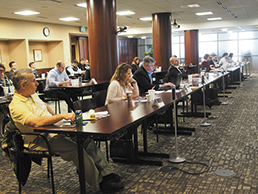Subscriber Benefit
As a subscriber you can listen to articles at work, in the car, or while you work out. Subscribe Now Geib
GeibBy Helen Geib, QDiscovery
Candid commentary from the bench was a highlight of this year’s IndyBar E-Discovery Day program. Technology competence emerged as the major theme of the judicial panel. Proportionality and the role of e-discovery consultants were among the other interesting topics.
The Hon. Doris Pryor of the U.S. District Court for the Southern District of Indiana brought the federal court perspective. The Hon. James Joven of Marion Superior Court provided complementary but distinct insights from Indiana state court. The panel was moderated by Jennifer Wright of Barnes & Thornburg LLP.
Technology competence starts with technology awareness. Both judges emphasized that lawyers need to understand we’re living in an electronic age and electronically stored information (ESI) is always potentially relevant.
Judge Pryor observed that many lawyers are seemingly unaware of the importance of newer data sources like Internet of Things (IoT) devices, the subject of a recent IndyBar CLE. Specific examples are wearables like Fitbits in employment cases and auto insurers’ driving monitors in car accident personal injury cases.
A common mistake litigants make in Judge Pryor’s court is not doing their homework into the scope of ESI discovery at the start of the case. The Southern District requires an ESI Supplement to the Case Management Plan. The key elements of the ESI Supplement are data sources and volumes, e-discovery software solutions and the form of production. She also sees many problems stemming from lawyers ignoring or failing to understand the form of production.
 Judge Joven acknowledged that state courts are not as sophisticated as the federal courts when it comes to e-discovery. This is partly due to the fact that the types of cases heard in state court tend to be less document-intensive. However, this is changing. He seconded Judge Pryor’s example of personal IoT devices and offered the further example of medical records, which are rapidly moving from hard copy to electronic format.
Judge Joven acknowledged that state courts are not as sophisticated as the federal courts when it comes to e-discovery. This is partly due to the fact that the types of cases heard in state court tend to be less document-intensive. However, this is changing. He seconded Judge Pryor’s example of personal IoT devices and offered the further example of medical records, which are rapidly moving from hard copy to electronic format.
I took the opportunity to ask the judges’ opinions about parties bringing an IT or e-discovery consultant to discovery conferences before the court. This prompted a rare – albeit minor – point of disagreement. Judge Pryor thinks it’s helpful to have a consultant on hand to help explain technology issues and provide technical information. She added that it’s good form to notify the opposing side and the court in advance.
On the other hand, Judge Joven encourages the parties to bring their consultants with them to the meet and confer instead. He wants counsel to educate themselves and the other side in the technical issues before bringing disputes to the court. My article “Meet and Confer Practice Pointers” offers tips for an effective discovery conference from another IndyBar panel presentation.
A question on cost-sharing prompted an especially interesting discussion of proportionality in state court cases. Indiana hasn’t (yet) adopted the proportionality test of the 2015 amendments to the Federal Rules of Civil Procedure. Nevertheless, state court judges rely on proportionality principles under the rule of reasonableness.
Judge Joven drills down into the details and looks at the case as a whole in deciding discovery disputes. He assesses the burden of the requested discovery, its importance and the value of the case. He will order cost-sharing in appropriate situations.
A key takeaway from the Judicial Panel is judges today expect lawyers to be familiar with their clients’ ESI. They should also be able to explain their positions clearly in e-discovery conferences and motions. These are basic requirements of technology competence for all litigators.
Finally, Judges Pryor and Joven vigorously agreed on the importance of counsel conferring in good faith. Many disputes can be narrowed if not resolved entirely with an informed, reasonable discussion between technologically competent lawyers.
This article was originally published on LinkedIn.
Please enable JavaScript to view this content.
